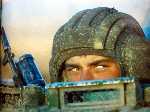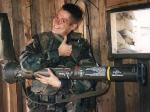Even on Iraq’s western edge, once referred to as the “foreign fighter freeway,” U.S. troops disagree about the role that foreigners play in the 3-year-old insurgency.
“Are there foreigners? Yes. Is it that big an influence overall? Probably not,” Lt. Col. Robert Jones, executive officer for Regimental Combat Team 7, said in a recent interview in his office at Camp Al Asad.
Meanwhile, just a few miles up the Euphrates River, a battalion commander disagrees. “They are the core,” said Lt. Col. Nick Marano, commander of the 1st Battalion, 7th Marine Regiment based in the Al Qaim region
Both men are talking about the same region, and presumably have access to similar intelligence. But they come to different conclusions about the role of Arab fighters from countries like Syria, Saudi Arabia, Yemen and Algeria.
“The fact you are getting so many conflicting views on the ground just shows what a tangled web of violence this has become,” said Farhana Ali, a terrorism expert with the Rand Corp., a California-based think tank.
The question is especially relevant in recent weeks, as U.S. military officials scrambled to identify the insurgent leader who would likely take over after the death of Abu Musab al-Zarqawi, the Jordanian-born leader of al-Qaida in Iraq...
Some troops say the foreign influence is based more on money than actual military-age men.
“The foreigner is like John Gotti, the foreign influence is money,” said Lt. Col. Norman Cooling, commander of the 3rd Battalion, 3rd Marine Regiment, currently based in Haditha. Gotti is a New York crime boss who was convicted in 1992 of federal racketeering charges.
“If I could eliminate the foreign influence, it would have a big impact because the local guy in the street would lose his motivation,” Cooling said. “But there are not many foreigners out there operating in the streets. They don’t have to.”
It is also influenced by a range of political factors — both on the Iraqi and American side — that lead some officials to overestimate the significance of foreign fighters, said Anthony Cordesman, a national security expert with the Center for Strategic and International Studies based in Washington, D.C...




 Reply With Quote
Reply With Quote

 Here's the most wanted list:
Here's the most wanted list:

Bookmarks